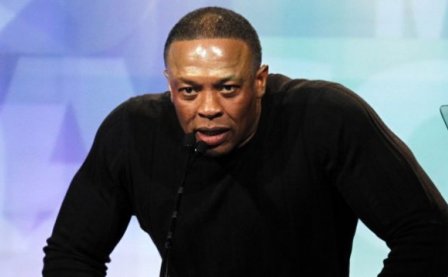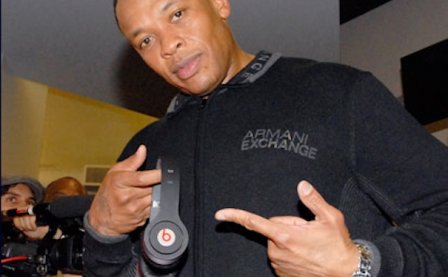Dr. Dre wants it both ways. In Compton, he wants to be the hard-nosed chronicler of the crime and deprivation endemic to his hometown of Compton, the social realist who documents its poverty and relies on our pricked conscience to invite change. Yet it also sees him wanting to celebrate his successful grab for fame and riches, including his rise to the top of the hip-hop food chain and his $550 million dollar fortune. Taken together, these two endeavors result in a glaring contradiction, a meeting of the vague desire to heal Compton’s wounds with the less-than-vague desire to gain the kind of profit that feeds into the system responsible for opening these wounds in the first place. Consequently, even though his supposed swansong may feature some characteristically flawless production and fine cameos from the likes of Kendrick Lamar, it cancels out its own meaningfulness in subtle hypocrisy.
This ultimately nullified significance is introduced with, appropriately enough, the album’s “Intro.” Here, a faux-1950s newsreel announcer reports on how the once-promising Compton has descended into lawlessness and destitution, with his accounts of the city’s “problems of crime and growing welfare” framing the album in such a way that you’d expect it to focus primarily on addressing these issues. Yet by the time the synth-dramatism of “Talk About It” rolls around a track later, these concerns have been entirely displaced by Dre’s materialistic boast that he’s “just bought California” and that the “world ain’t enough” for his all-consuming greed. Worse still, the abruptly sentimental chorus delivered by Justus has the guest unapologetically declare, “I want it all,” implying that he’s entirely willing to hoard wealth for himself and stop it from being redistributed to the very same communities that the introduction had just highlighted as being impoverished.
On their own, such declarations of financial lust aren’t necessarily objectionable. However, given that Compton features numerous comments on the plight of the eponymous city, they’re made harder to swallow. For example, compared against the would-be political commentary offered by the sleepy “Animals,” self-congratulatory outings like “Darkside/Gone” play out as a little tasteless and misplaced. During its bellicose lurch toward piano-tinkling introspection, Dre once again flaunts his wealth and status, rapping “You ain’t even made it up to my throne” and “[I’m] driving some of the hottest cars L.A. has ever seen.” By contrast, “Animals” sees Anderson .Paak draw attention to “old sneakers” and “faded blue jeans” — that is, to the privation and discrimination many African-Americans still face within the US. As valid as his observations on how “the upper class hate” and how “The only time they wanna turn the camera on/ Is when we’re fucking shit up” unquestionably are, they’re undermined by the self-aggrandizement of a “Darkside.” Indeed, they’re undermined by all the other songs on the album that, to borrow a phrase from the laidback vibing of “All in a Day’s Work,” bullishly fanfare about how Dre is “rich as fuck.”
To be fair, this isn’t the only thing Dre pipes about on Compton, and at first glance, the causal relation between his prosperity and Compton’s ills might not be obvious. Yet the fact remains that, when he isn’t recording (which is often these days), Dre is the Co-Founder and Director of Beats Electronics, a company that booked $1.5 billion of revenue in 2013 and that was bought in 2014 by Apple for $3 billion.
Like most companies in America and the developed world, Beats thrives on cheap labor, both in its Chinese manufacturing bases and in the innumerable US retail outlets that pay their staff a measly wage. On the one hand, outsourcing production to China strips the US economy and its population of the corresponding jobs, thereby exacerbating the problems of unemployment and urban decay that have scourged Compton-esque towns for decades. On the other, those in the US who’ve been fortunate enough to hold onto a job are still frequently paid so little they have to claim welfare, since corporations like Beats ship their products largely through Walmart, Amazon, and other major distributors who exploit economies of scale and who pay their similarly exploited workers a pittance. Such distributors and corporations depend on high rates of unemployment to deliver them a labor market of people desperate enough to accept low pay and undignified conditions, since without pliant and underpaid employees, they wouldn’t be able to leach exorbitant dividends for their shareholders and chief executives.
In other words, these companies rely for their successes on the immiseration of cities like Compton, which means that Dre in particular has also benefited from the misfortunes of his hometown. The often disadvantaged status of its inhabitants makes them ripe for the picking by some heartless employer who would offer them peanuts in exchange for their souls, and in fact — lo and behold — a quick scan of recent news divulges that none other than Walmart has recently announced plans to open a branch in the city. Apparently, this infiltration will create 300 new jobs in the area, no doubt staffed by people who will have the honor of being paid $9/hour for selling Beats headphones on behalf of Dr. Dre and his expanding empire.
So, given that Dre is indeed a beneficiary of the very predicament he opposes on a track like the Dr. No tribute that is “Issues,” and given that Compton often trumpets his affluence and ascendancy, it’s therefore little wonder that a self-negating conflict haunts the album. Because its two central messages are inconsistent with each other, it robs itself of meaning and credibility, becoming little more than a diverting yet fundamentally shallow run through glossy production and guest-spotted verbal gymnastics. To Dre’s credit, this production is relatively diverse, from the drill-influenced “Talk About It” to the glitchy claustrophobia of “Deep Water” and the classic, horn-ribboned opening of “Loose Cannons,” yet once again, it’s undercut by a paradoxical opposition that completely annuls any deeper or wider resonance that these numbers might have possessed. They say one thing and then say the complete opposite, ensuring that, in the end, they say nothing at all.
It’s no stretch to imagine that this antagonism is the result of Compton’s unusual genesis. The album, being an accompaniment to the long-awaited N.W.A. biopic and Dre’s farewell to the rap game, is therefore the product of two divided aims. One of these tasked it with supplying a gritty film with a correspondingly gritty aural counterpart, while the other obliged it to aggrandize the legend of its author. It’s therefore no wonder that, for every “Just Another Day” and its protestations that “all we got is the swap meet,” there’s a “Talking to My Diary” that sees Dre proclaim, “my house got a view of the city like a highrise.” As laudable or enjoyable as these two strands might be when taken in isolation, they invalidate each other when combined into a single record, since the kind of improvement in Compton’s situation called for by the album would necessitate a decrease in the worst kinds of capitalistic practices, just the kinds of practices Dre has harnessed while climbing his way up the Forbes list.
Not that Dre isn’t completely insensitive to this clash of aims. Aware that some cognitive dissonance inevitably follows from underlining the negative effects of discrimination and simultaneously heralding your own standing as a billionaire, he occasionally tenders some defensive lyrics, including the “They just think I want the money, why?” line that welcomes the Eminem-operatics of “Medicine Man.” Added to such rearguard actions, he also recently announced that he’ll be donating all of his royalties from Compton to a fund for a community arts center in the city. So, as much as this review has blasted him for his two-faced inconsistency, this is an admirable gesture on his part. Sure, art alone won’t be nearly enough to lift an entire city out of its particular quagmire, but at least it offers recognition that L.A.’s “hub” and other urban centers like it have, in one way or another, given much to him over the course of his careers in both music and business, and that now it’s time to give a little something back. And Compton itself is a part of this little something too, because even though it fails to make a clear artistic statement, it houses some of the finest hip-hop production Dre has turned in for years, and proves that the city has much more going for it than just a bad reputation.
More about: Dr. Dre



